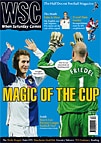 Cameron Carter takes a look at the Joey Barton story, while discovering how the game has changed since 1957
Cameron Carter takes a look at the Joey Barton story, while discovering how the game has changed since 1957
Gabby Logan has a great listening face, possibly one of the best on television. Her gleaming eyes and soulful nodding, even when filmed after the interview, lead her subject and viewer alike to believe that this is a woman who not only cares, she might also remember some of the things her interviewee said 20 minutes later. The expression is one of distilled empathy, her listen a strong, steady listen – rather like the diligent way you attend someone who’s telling you his life story while buying you drinks all night. This bedside manner was seen at its best on Inside Sport (December 3, BBC1) as she asked Joey Barton to explain himself to the nation.
Now, Barton is not a dull man in the first instance and has probably been advised to say what’s on his mind in anger-management seminars, so this was always going to be one of the less banal sporting interviews. He does, though, have a lot of explaining to do. The Troubled Boy motif was raised in the first few minutes, underscored by the tinkly piano background of Radiohead’s Paranoid Android (“When I am King you will be first against the wall”).
The trouble with people who speak their mind is that they have a tendency to act their mind also and Barton found himself having to be honest and open about each one of his assaults on fellow players and fans. At one point he said, aggrieved: “I think every mistake I’ve ever made’s been in the papers.” Well, the thing is, there are mistakes and there are mistakes. Hitting a 15-year-old in a Bangkok drinking hole and stubbing a cigar out in a colleague’s eye count as one type of mistake, while eating four miniature pork pies or buying your daughter the wrong type of trainers count as another. Unfortunately, Barton doesn’t distinguish between the two types.
When reminded that lazy people might view his CV of violence as a guide to his personality, he agreed that his past actions had been wrong but added: “Hindsight is a wonderful thing.” Perhaps the next stage of Barton’s anger-management therapy, now that he has embraced the qualities of hindsight, could be to investigate the potential of foresight, another wonderful thing and one that might help to keep him out of the papers.
A Game of Two Eras (BBC4, December 13) contrasted the 1957 FA Cup final with 2007’s joyless affair, to illustrate the changes in style of play and attitude over the intervening years. One of the major transformations is in the way players celebrate goals. In 1957, Peter McParland performed a trembling run followed by a short series of springing hops, not unlike a Beatrix Potter character on emerging from its den to find spring had come once more. There being only one televised match a year and no video recorders around, these were players who had never seen themselves on screen. Consequently they had none of the self-consciousness of today’s players, who know the importance of looking good for the camera even in the throes of delirium.
Statistics showed that 83 per cent of passes in 2007 were completed, while only 66 per cent were successful in 1957, an indication that getting the ball quickly out to the wingers was the big idea in the Fifties, while the more patient modern game asks its exponents to keep possession and actually believes football can be played without a Scottish inside-right. While there were 39 fouls last year, only 22 were committed in 1957 and the charge from McParland on Ray Wood that broke the United keeper’s cheekbone was not one of them. Interviewed today, McParland is unrepentant about this challenge, saying: “Ray kept coming towards me.” This despite the visual evidence that when Wood had the ball safely in his hands McParland still had to cover six yards to crash into his clearly stationary figure.
In addition to the greater protection of goalkeepers, the medical aspect of the game has improved. When it became clear Wood had to go off, and even though the cause may well have been a serious neck injury, team-mates and a man in plain clothes with the bearing of a doctor simply tugged at Woods’ jersey until it was finally yanked over his head and passed to Jackie Blanchflower to deputise in goal. The overall picture of British football half a century ago is of a more honest, naive and dangerous game than today’s. Joey Barton would probably fit in quite nicely.
From WSC 252 February 2008